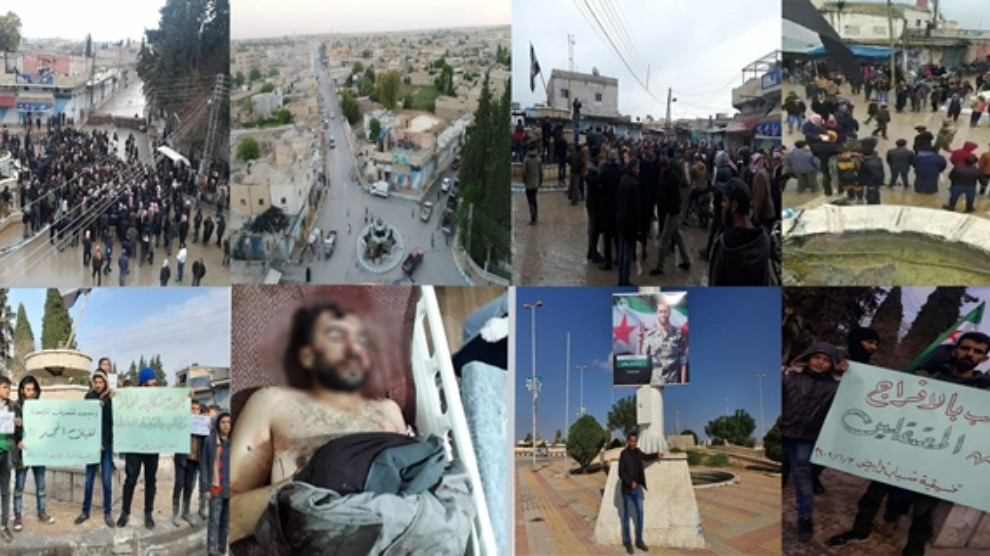ANHA news agency published a three-month report on the occupation of Girê Spî (Tal Abyad) by the Turkish army and mercenaries of the so-called Syrian National Army (SNA). As a result of the invasion, which began on October 9, 2019, at least 300,000 people in northern and eastern Syria have been forced to flee. Reports from the region bear witness to serious human rights violations on a daily basis.
Expulsion and ethnic cleansing
The Turkish regime has displaced thousands of people from Girê Spî and is pursuing the goal of making lasting changes to the population structure. Jihadists and their families have been settled in place of the displaced persons. The Turkish state repeatedly refers to these jihadists as the original owners of the city while they are in fact from Azaz, Jarablus, al-Bab and Idlib. According to ANHA, 180 families of jihadists have been settled in the Leyl and Jawish neighborhoods alone. In addition, some 500 ISIS jihadists who escaped to Turkey during the operations by the Syrian Democratic Forces (SDF) were used by the Turkish state as SNA mercenaries in Girê Spî. ISIS women who escaped after the Turkish air force bombed the Ain Issa camp have been settled in the areas of Ain Erus, Leyl, Ermen and Cisir.
Turkification of the city
The occupation troops were initially directed against the historical structures and important institutions of the city. Turkish was introduced as the compulsory language of instruction in all schools and mother-tongue teaching was banned. Streets, squares, schools, hospitals and service facilities were systematically renamed by jihadists after militaristic Turkish names and Turkish flags were hoisted in many places. In addition, Turkish identity cards have been distributed, while people with Syrian identity cards have been arrested.
Famine in the city
There is hunger in the city and protests against the continuously worsening economic situation are staged again and again. The living conditions are catastrophic. The supply of electricity and fuel is not available. Especially the lack of drinking water and bread makes life difficult. People have to queue for hours to get bread. The silos and storage facilities of the local people were plundered by the SNA mercenaries. 50,000 tons of grain were stolen from the Dihêz depots which are now unusable due to the attacks. This policy is deliberately implemented by the Turkish state to force people to flee.
Kidnappings and extrajudicial executions
Time and again there are kidnappings in connection with ransom raids, but also extrajudicial executions. Some examples researched by ANHA are:
The sons of the former head of the Ain-Issa camp, Heyen Ayaf (16) and Abdulrahman Ayaf (18), were kidnapped. The jihadists demanded a high ransom. The young men have disappeared until today.
Ten civilians from the Arab tribe of Abu Asaf were kidnapped, and dozens of mostly Turkmen youth from the village of Dadat.
A civilian who was distributing relief supplies to villagers in Sukeriye was kidnapped on 4 December.
In the village of Zeydî, about 30 kilometers away from Silûk, SNA mercenaries stormed five houses and kidnapped 20 people, most of them minors.
The other Arab families from the village were displaced. Houses were also stormed in the town of Ain Erus and an unknown number of young people were abducted.
The SNA jihadists loot shops and murder civilians. In Erîda, Mahmud Zahir (60) and Berho Elo (65) were killed for unknown reasons. Another example is the taxi driver Ammar Haci, who was kidnapped and cruelly murdered by the jihadists.
Torture and detention of minors
Mihemed Bozan Seyid was abducted from the village of Celkê. He was tortured for days by the SNA militiamen. Afterwards four more minors aged 13 to 15 years were abducted. Although the village was surrounded, the families were able to reach the security forces Ain Issa but there is no news of the children. According to local sources, there are prisons in the villages near Girê Spî where minors and young people are tortured.
Women forced to cover up
With the return of the ISIS jihadists, violence against women has also increased. Women are once again being forced to cover themselves up. In the Cisir neighborhood, for example, a woman was molested by SNA militiamen. Residents protesting the incident set fire to a base of the mercenaries. While three women were kidnapped from the village of Hiwecaye, Yara Ahmed from the town of Ain Erus was abducted and tortured.
Fadiya Şerîf Xelîl from the management of a camp for internally displaced persons from Girê Spî also reports that the situation for women in the occupied territories has deteriorated massively. Women still living in the occupied territories are exposed to systematic violence and no human rights organization is helping them.
Uprising under the slogan "Occupiers out"
After brutal attacks by the Turkish state, Arab tribes in particular have left the region. Remaining members of the Begare tribe were exposed to attacks by SNA militiamen. After several murders, members of the Begare tribe have also left the region. Nevertheless, the slogans "Death to Erdoğan" and "Occupiers out" appear on many walls in the city.
In Silûk, Ain Erus, Ali Baciliye and in the center of Girê Spî, protest actions took place despite the often deadly repression.
Fawad Ali from Girê Spî tells: "The Arab tribes reject the Turkish occupation. No one must remain silent in the face of the crimes of the Turkish state. The occupiers will be defeated by the determination of the peoples and their uprising. The tribes in Girê Spî must maintain their protest against Turkey."
Militiamen are sent to Libya
Some of the SNA mercenaries are sent by Turkey to Libya to support the Muslim Brotherhood regime there. According to information from the region, almost 1,000 mercenaries were transferred from Girê Spî to Libya. The Islamist troops are promised wages of 2,000 dollars a month in return.














